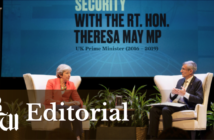It was common among social outcasts, criminals, sailors, circus performers, and rebels alike. Now, according to the Pew Research Center, about 40 percent of millennials have one, too. What is this mysterious entity that they share? Tattoos.
They seem to be everywhere now. Women grace the red carpet in luxurious gowns, and then whoosh, they turn around and you see a tiny symbol inscribed on their back. Men roll up their sleeves to reveal a second sleeve. Some celebrities are less discrete, like in the case of Lena Dunham, Mike Tyson, Travis Barker and Rihanna. Luckily, their tattoos distinguish them from other performers and give them an edge, a valuable trait within their respective industries.
Employers of college students usually do not share this same concept of individuality. Considering that job and internship interviews are already starting, and tattoos have become so common for people our age, students should be aware of how tattoos could impact their search.
Due to Title VII, employers clearly cannot discriminate based on race, gender, sex or religious beliefs, but they can legally establish rules about employees’ personal appearance, including tattoo policies. Even if a company does not have a formal ban, there appears to be a professional norm against visible tattoos in many of the industries that require a college education.
An article, “Body Art is Growing More Popular, Though Few Employers are Keen,” discusses a study conducted by the University of St. Andrews in Scotland that “asked participants to assess job candidates based on their pictures, some of which were altered to add a neck tattoo.” It reported that “Inked candidates consistently ranked lower, despite being equally qualified.” The past association of tattoos with outlaws might still be leaking into employers’ minds, giving them the impression that the tattooed candidates are reckless or immoral.
While tattoos still may be connected with impulsive behavior, most people carefully decide to get a tattoo after much consideration. The face of tattoos might belong to rebels, but tattoos have adorned the bodies of many surprising people who don’t fit that category. Some prominent historical figures had tattoos, including George Orwell, Teddy Roosevelt, Dorothy Parker, Winston Churchill and Thomas Edison — whose electric pen actually led to the creation of tattoo guns, according to an article called “10 Historical Titans with Surprising Tattoos.” A more recent example is Jill Abramson, the first female executive editor of The New York Times, who had “a New York Times-style ‘T’ tattoo, among other visible body art,” according to Lynn Monty’s article, “Workplace Tattoo Taboos Fading.”
Another reason why tattoos are deemed inappropriate for work is due to the fact that many work environments make a strong distinction between their employees’ personal and private lives, enforcing policies that significantly depersonalize the workplace. Tattoos are an inherently open symbol of individuality, almost like wearing your heart on your sleeve. Since many tattoos are deeply meaningful and unique, they awaken human curiosity and the neutral facade is lost. If they are visible, tattoos permanently disrupt the barrier between personal and professional.
Isn’t that sometimes a good thing, though? Building strong work teams requires trust and communication, which can’t be accomplished when colleagues feel like strangers. A tattoo represents part of people’s personalities, or at the very least what they find aesthetically appealing, and it fills in a piece of the puzzle of their identities outside their position.
Interviews are short. Employers make snap judgments based on candidates’ resumes and how they present themselves, and, unfortunately, their appearance also tends to be factored in. However, employers are not the only ones evaluating the potential work relationship. Students being interviewed should consider what they value in a job.
Most people work at least 40 hours a week, so that is a substantial amount of time. What do you want to gain from your investment of time and effort? A dependable paycheck? Or do you also hope to find a job that offers an inviting work setting as well, where superficial and arbitrary rules do not restrict employees? Straight out of college, that may be a lofty ideal, but as we move throughout the workforce, these are questions we should keep in mind.
Tattoos do not add or detract from the candidates’ professional skills or experience, so they ideally should not be part of the evaluation. Unless the tattoos are violent or offensive, they should be thought of as irrelevant as the color of the candidates’ shirts.





Comment policy
Comments posted to The Brown and White website are reviewed by a moderator before being approved. Incendiary speech or harassing language, including comments targeted at individuals, may be deemed unacceptable and not published. Spam and other soliciting will also be declined.
The Brown and White also reserves the right to not publish entirely anonymous comments.